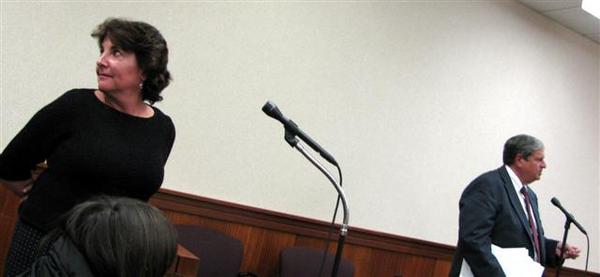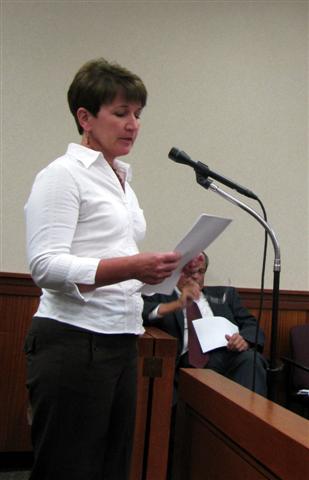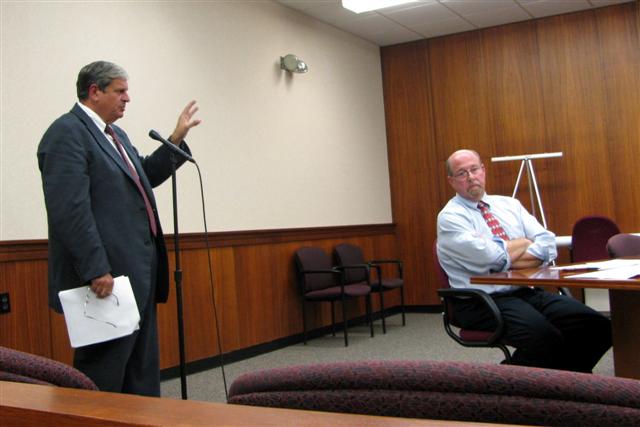
North Adams Council Rejects Insurance Review
 North Adams Teachers Association President Susan Chilson reads a statement to the City Council. Top, city business manager Nancy Ziter and Mayor John Barrett III answer questions about insurance. |
Mayor John Barrett III and the challenger for his office, City Councilor Richard Alcombright, were on opposite sides, with Alcombright pushing for a review and Barrett considering it a waste of time.
The unions, in the latest round in a yearlong battle with the city over insurance rates, have accused city officials of underfunding North Adams' self-insurance fund and not fulfilling its obligations to cover 70 percent of the premium split. They claim the city has underfunded the account some $1.8 million over three years and are calling for an independent audit.
The vote, with Councilors Michael Bloom and Clark Billings absent, came after more than an hour of discussion and questions by councilors, mayor and union members; city business manager Nancy Ziter also answered councilors' queries.
Alcombright, a member of the Finance Committee, brought the issue to the council after receiving a written request from the North Adams Teachers Association, North Adams Police Association Local 382 and North Adams Firefighters Association Local 1781.
The three unions wanted the Finance Committee, a subcommittee of the council, to review the account. Susan Chilson, president of the NATA, said their analysis "discovered enormous problems with the city's health insurance" and called for greater transparency in the city's dealings.
One or more of the three unions have filed complaints with the labor board; their leaders said Tuesday they were willing to put the complaints in abeyance if the Finance Committee did a review.
| North Adams Self-Insurance Fund |
| ■ About $3 million is placed in the account at the beginning of the year. ■ The account is overseen by the city's treasurer and/or business manager. ■ Set payments are made monthly to Blue Cross Blue Shield; reconciliations are made every quarter. ■ An insurance broker tracks and reviews claims. |
Barrett, however, said a council review was unnecessary since the issue was already in mediation because of union complaints filed with the Labor Relations Board and that more than 1,500 pages of information on the city's health insurance system had been released to the unions.
"I'm basically standing here before this City Council saying, we put our 70 percent in because you want to know why?" he asked. "Because they put their 30 percent in and that 70 percent has to come from someplace."
He also took councilors to task for saying they didn't really understand the Medical Insurance Trust "since 2002, at various times I've come to the council and asked for appropriations or transfers of $1.3 million in to the trust and, during that time, went through the whole litany and explained it the to City Council."
The unions' allegations were not only "an attempt to sully my reputation," said Barrett, but also past treasurers who have watched over the trust fund. He pointed to Moody's recent A3 rating for the city as an example of good financial stewardship despite the economic crisis.
Alcombright countered that the union complaints and the issue of the city's premium obligations were separate issues. "The question still remains ... have the splits been 70/30," he said. "That's the crux of this issue."
Barrett said it was better left to the mediator, who could bring in an independent reviewer. "If [their case] is as good as they say it is, they're going to win but if it isn't, they've got two more steps to go," he said, but added he was confident the city would prevail.
Despite Alcombright's vow "not to politicize or bring this mayoral race into City Council chambers," it was difficult to avoid. The mayor noted his "well-versed" experience of the city's insurance plan; Alcombright defended comments he'd made about not fully understanding the how the plan worked, particularly how the split was paid.
"I'm automatically going to assume that the city is paying its part," Alcombright said of approving the fiscal 2009 budget with its $3 million Medical Insurance Trust line item. But as allegations have been raised, "I don't think it's a bad thing to do" a review, he said.
Alcombright also intended to remove himself from the Finance Committee during its review of the insurance issue to fend off any taint of political game play. City Councilor Gailanne Cariddi, however, asked why that was necessary since examining such issues was part of a councilor's responsibility. When the other councilors appeared to agree, Alcombright withdrew the motion.
But the council declined to refer the insurance issue to the Finance Committee, with Cariddi, Council President Alan Marden and Councilors Lisa Blackmer and Marie Harpin voting naye; Alcombright was joined by Councilors Robert Moulton Jr. and Ron Boucher voting aye. Both Boucher and Blackmer hesitated before giving their votes.
 |
He said firefighters were 100 percent behind him but "if the money's there I'll be the first to apologize."
In other business, the council:
■ Affirmed the mayor's reappointments to the Industrial Development Finance Authority of William Boland until March 31, 2013, Christopher Lamarre until March 31, 2012 and W. Mark Wheeler to expire March 31, 2011; and to the License Commission, Jeff Polucci until June 1, 2015.
■ Approved several transfers from the reserve account to cover salary changes from anticipated raises and a shortfall in the Police Department salary account because overtime, the use of reserves and a retirement severance package.















